“By Any Other Name”
Written by Jerome Bixby and D.C. Fontana
Directed by Marc Daniels
Season 2, Episode 21
Production episode 60350
Original air date: February 23, 1968
Stardate: 4657.5
Captain’s log. The Enterprise responds to a distress call on a Class-M planet. A landing party consisting of Kirk, Spock, McCoy, Lieutenant Shea, and Yeoman Thompson beams down to investigate, and encounter two Kelvans, Rojan and Kelinda. Rojan thanks them for their quick response and then informs them that they’ll now surrender themselves. The Kelvans press a device on their belts that paralyze the landing party, and Rojan announces that he’s their commander now, and they’re heading to another galaxy. Their lives as they know them are over.
Kelinda takes all their equipment and then frees them. The Kelvans are from the Andromeda galaxy. They were scouting the Milky Way as a possible place to conquer, as Andromeda will be uninhabitable in the next ten millennia. But their ship was damaged by the galactic barrier, so they’re taking the Enterprise. Even as Rojan talks to Kirk, three more Kelvans, Tomar, Hanar, and Drea, take over the ship with ease.
Rojan explains that they’ll modify the engines so the journey will only take three hundred years, rather than the thousands it would normally take for the Enterprise. Even so, they expect to die en route, with their descendants taking over the mission, just as they were born in the intergalactic void and took over the mission from their ancestors.
Kirk tries a diplomatic approach, to work with the Federation to find suitable uninhabited planets for the Kelvans, but Rojan says that the Kelvans can only conquer.
The landing party is imprisoned. Hanar reports to Rojan that the ship is being modified. Rojan is looking forward to being in space—a planet is too chaotic, too open for him. Also he doesn’t like all the sensations that the humanoid form provides. It turns out that Kelvans look much different, but they encased themselves in human form because that is the atmosphere of the ship they’ll be living on the rest of their lives.
The landing party discuss options. Spock tries the same mind trick he used on Eminiar VII, but Kelinda’s mind is too strong. However, when she enters the cell to determine what just happened, Kirk jumps her and takes her belt device. However, Rojan and Hanar capture them in short order. As punishment Rojan turns Shea and Thompson into tiny dodecahedra. Rojan crushes the one that was Thompson, but restores Shea.
Kirk needs McCoy and Spock back on the ship, so Spock goes into a trance that makes it look like he’s lapsed into a coma. Hanar inspects Spock, and agrees to have the two of them beamed aboard. Tomar accompanies McCoy and the comatose Spock to sickbay. McCoy gives him two shots of stokaline—which is harmless—and spins a story to Tomar about a Rigellian flu that flares up periodically.
The ship is modified and they set out at warp 11 toward the galactic barrier. Kirk goes to sickbay, ostensibly to check on his sick first officer, and Spock, McCoy, and Scotty are endeavoring to jam the Kelvans’ power source. Unfortunately, it’s too well shielded to jam. Spock and Scotty provide an alternative: destroy the ship when it goes through the barrier. However, Kirk refuses to go through with it, going with the where-there’s-life-there’s-hope philosophy.
They slam through the barrier and into intergalactic space. Now that they’re through, the Kelvans don’t need all four hundred people. They can’t guard them efficiently with only five of them, and the food synthesizers can’t feed everyone for three hundred years, so all nonessential personnel—basically, everyone except for Kirk, Spock, McCoy, and Scotty—are reduced to dodecahedra. Rojan also reveals that he knew about the suicide plan as well.
As the four of them share an awkward and tense dinner, Tomar asks why they eat food when pills can handle the task of nutrition just fine. Kirk says don’t knock it until you try it, and Tomar finds that food is actually quite yummy.
The images Spock saw in Kelinda’s mind are starting to coalesce. The Kelvans apparently only have sight as a sense—their other four are stunted to the point of uselessness. But now that they’re in human form, they’re enjoying things—as witnessed by Tomar’s snarfing down his meal.
Kirk decides to try seriously stimulating their senses. Scotty takes Tomar to his quarters for a wee nip of the good stuff. McCoy declares Hanar to be anemic and encourages him to eat solid food instead of pills, and also gives him a “vitamin shot” (really formazine, which will make him irritable and cranky) three times a day. Kirk, naturally, tries seducing Kelinda—it actually works, but more as an academic curiosity for her than any particular response to Kirk’s manliness. Spock plays chess with Rojan and discusses how humans are silly—and he’s apparently jealous of Kirk’s attentions to Kelinda, since Spock beats him at chess.
Rojan storms to Kelinda’s quarters and tells her not to fraternize with the humans, especially Kirk. Kelinda wants to know if he gave that order to the others (he didn’t), and he’s obviously brimming with jealousy. Hanar mouths off at Rojan, Kelinda comes to Kirk to ask for more research on how humans interact with each other (involving smooching, of course). Spock informs Rojan that Kirk and Kelinda were in the rec room together. Rojan angrily goes to the rec room, and he and Kirk get into a brawl. (At one point, Spock and McCoy walk in and catch Kirk after Rojan tosses him across the room. Kirk says, “I’m stimulating him,” and Spock and McCoy shrug and toss him right back into the fight.)
Kirk points out that they’ve only been human for a few days and they’ve already been corrupted—they’ll be unrecognizable by the time they reach Andromeda. Kirk again offers the Federation’s help—they wouldn’t welcome invaders, but they would welcome friends. Spock points out that this is a chance to form their own destiny instead of following orders their ancestors got three centuries ago.
Rojan agrees, and turns command back to Kirk, who orders Drea to turn the ship around and go back home. The crew of the Enterprise has won the day by use of sex, booze, and drugs. Woo hoo!
Can’t we just reverse the polarity? The Kelvans have a nifty little machine that powers their belt devices, which can either paralyze someone or reduce them to a dodecahedron.
Fascinating. Spock’s brief mind-meld with Kelinda through the walls of the cell prove valuable in gaining intelligence about the Kelvans.
I’m a doctor not an escalator. McCoy basically lies about injections throughout the episode, first regarding what he’s giving Spock to Tomar, then to Hanar about what he gives to the Kelvan.
Hailing frequencies open. Uhura coordinates the damage control reports after the Enterprise goes through the barrier, then gets turned into a dodecahedron for her trouble.
It’s a Russian invention. Chekov navigates through the barrier, then gets turned into a dodecahedron for his trouble.
I cannot change the laws of physics! Scotty gets Tomar drunk. At one point, he pulls out a drink and is too swozzled to remember what it is, so he drunkenly identifies the libation to Tomar: “It’s green.” This scene will be echoed when James Doohan guest stars as Scotty on TNG‘s “Relics” when Data serves an unlabeled bottle to Scotty and can only say that, “It is green.”
Go put on a red shirt. Shea gets turned into a dodecahedron, but then gets turned back—though presumably he got turned into one again back on the Enterprise, since 425 of the 429 people on board did. Well, 428, thanks to poor Thompson getting killed. She’s the first female redshirt…
No sex, please, we’re Starfleet. Kirk’s seduction of Kelinda is hilarious. (“I don’t usually go around beating up beautiful women?” “Why not?”)
Channel open. “You have more?”
“All I have is a bottle of very very very old Scotch. Whiskey!”
“I will try it!”
“I’ll get it!”
Tomar and Scotty’s booze-up.
Welcome aboard. The Kelvans are played by Warren Stevens (Rojan), Barbara Bouchet (Kelinda), Robert Fortier (Tomar), Lezlie Dalton (Drea), and Stewart Moss (Hanar), the latter having previously appeared as the ill-fated Joe Tormolen in “The Naked Time.” Enterprise crew are played by recurring regulars James Doohan, Nichelle Nichols, Majel Barrett, and Walter Koenig, as well as guest stars Carl Byrd as Shea and Julie Cobb as Thompson, the latest and most ill-fated member of the post-Rand yeoman derby.
Trivial matters: Like “Dagger of the Mind” and “The Conscience of the King” before it (and “All Our Yesterdays” and “How Sharper than a Serpent’s Tooth” after it), the title comes from Shakespeare, and Kirk actually quotes the bit from Romeo and Juliet whence the title derives to Kelinda.
The galactic barrier was last seen in “Where No Man Has Gone Before” and will be seen again in “Is There in Truth No Beauty?” Kirk and Spock reference the mind-meld-through-a-wall he employed in “A Taste of Armageddon” and try it again, to weird effect.
John Coffren wrote a sequel to this episode called “Gone Native” for Strange New Worlds 9.
Your humble rewatcher always thought that the Kelvans were a handy explanation for the major leap in technology that Starfleet made between the end of the five-year mission and The Motion Picture, but he was never able to put that into a piece of fiction.
To boldly go. “We do not colonize—we conquer, we rule.” This episode would be considerably more effective if the Kelvans didn’t come across as such total morons. I mean, they’re supposed to be this amazing badass intergalactic conquerors and they fall for the sick prisoner trick?
Not that the crew is much more impressive. We’re supposed to believe that three of them managed to completely overtake the Enterprise without resistance? Yes, they have the belt device that paralyzes people, but we’re talking four hundred people against three (remember, Rojan and Kelinda stayed on the planet—heck, Hanar was on the planet a lot too, so it was just Tomar and Drea up there). At no point did they even try to take the ship back?
Also, while the continuity hit with “Where No Man Has Gone Before” and the galactic barrier was appreciated, how’d they get through this time when they couldn’t get through last time? And why weren’t crew members with ESP affected this time?
We’ve been down this road before: aliens who take on human form and are overwhelmed by the sensations of being human, and it wasn’t any less absurd in “Catspaw” than it is here. Okay, it was more absurd in “Catspaw,” but still, it’s just goofy here. (Although, we’ve got references to giant tentacled creatures, who sound a lot like Lovecraft’s Old Ones, which both “Catspaw” and “What Are Little Girls Made Of?” referenced.) At least they sow the seeds of it with Rojan and Hanar’s discussion on the subject of how oogy being human is, but still.
The real oddity here, though, is Kirk’s unusual indecision. Spock and Scotty have given him a perfect opportunity to stop an alien invasion of the galaxy, and he doesn’t take it. Throughout all of Star Trek, our heroes have had a willingness to sacrifice for the greater good, and even though they don’t often make that sacrifice due to being regulars on television shows, they’re always willing. So Kirk’s waffling on the subject just rings completely false.
This is an episode that could have worked better as a more serious tale. (Allegedly, Jerome Bixby’s original script was darker, and D.C. Fontana was charged with lightening it up. This was probably a mistake.) Actually having a serious examination of the difficulty the Kelvans had transitioning to human form, making it a true conflict instead of fodder for childish humor, might have made for a more compelling story. Instead, it’s a pointless bit of fluff.
The episode was so irritating that after it was revealed that Thompson was killed while Shea survived, all I could think was, “Wow, usually it’s the black guy who gets killed first.”
Warp factor rating: 4
Next week: “Return to Tomorrow”
Keith R.A. DeCandido will be a guest at (Re)Generation Who 2 in Cockeysville, Maryland this weekend. Other guests at this delightful Doctor Who convention include former Doctors Peter Davison and Colin Baker, as well as actors Michael Troughton, Nicola Bryant, Sophie Aldred Henderson, Wendy Padbury, Deborah Watling, Anneke Wills, Terry Molloy, and Frazer Hines, Big Finish’s Jason Haigh-Ellery and Nicholas Briggs, musicians Cat Smith and Dominic Glynn, podcaster Dr. Arnold Blumberg, LEGO designer Andrew Clark, performers Antipode and Hannah Harkness, artist Kelsey Wailes, and fellow writers Robert Shearman, Nev Fountain, John Peel, Darren Watts, and Walt Ciechanowski. Keith will have a table where he’ll be selling and signing books; his full schedule is here.










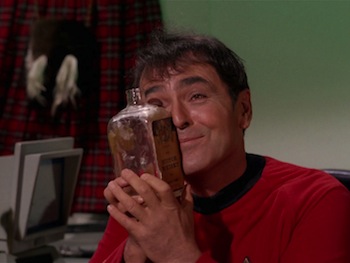
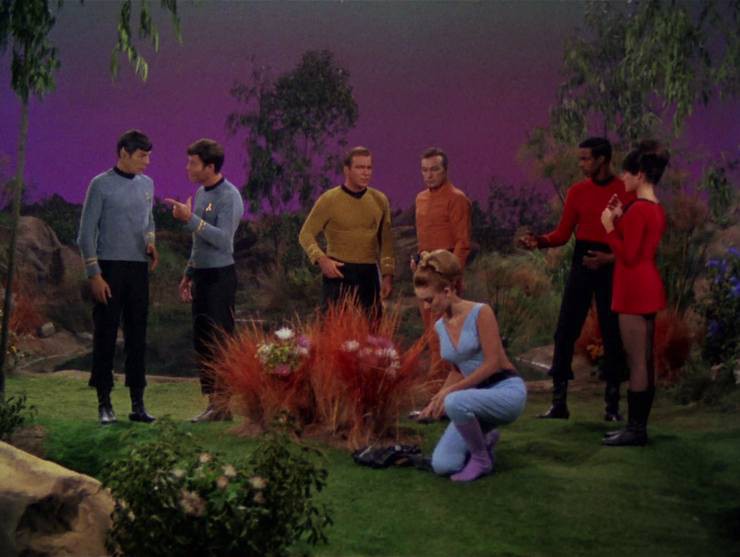
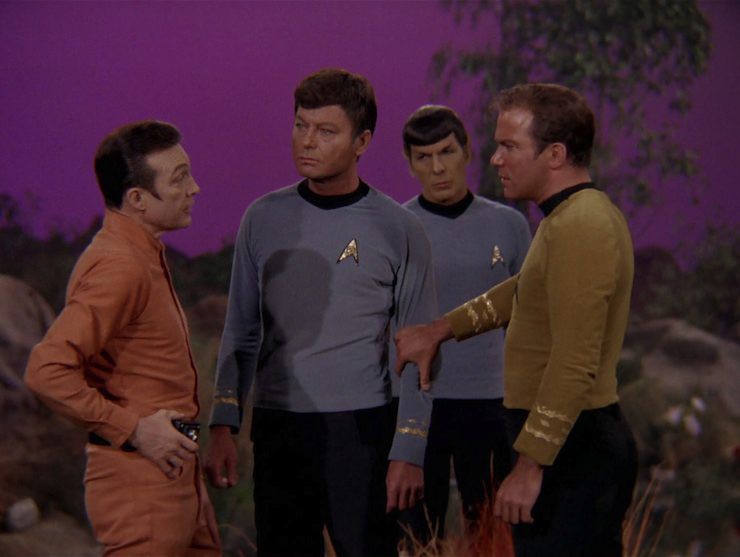
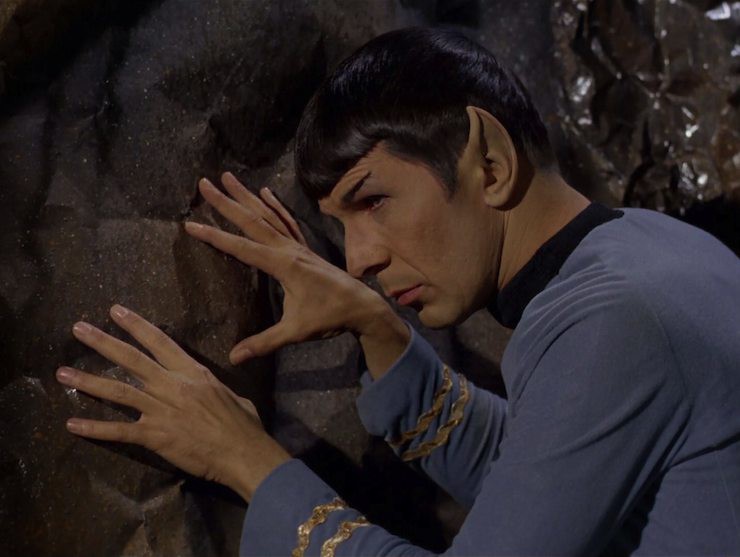
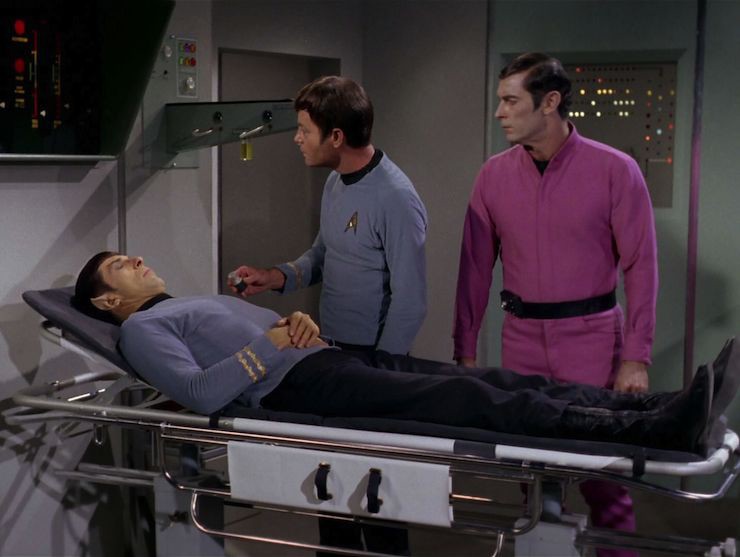
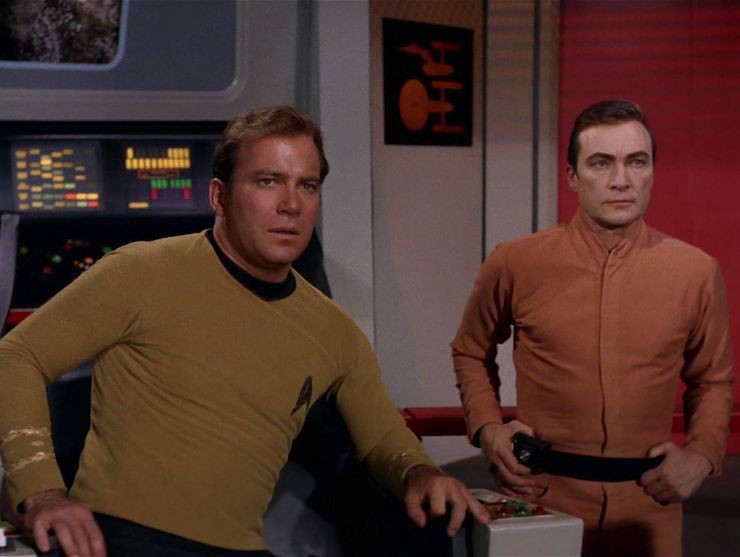
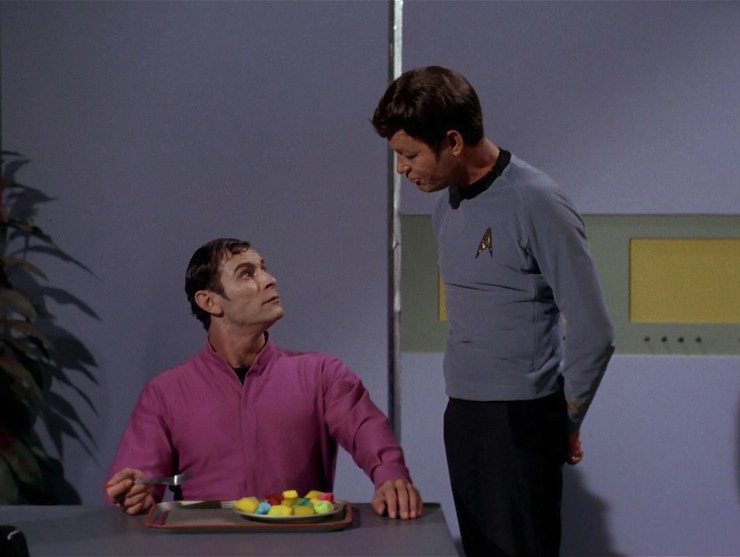
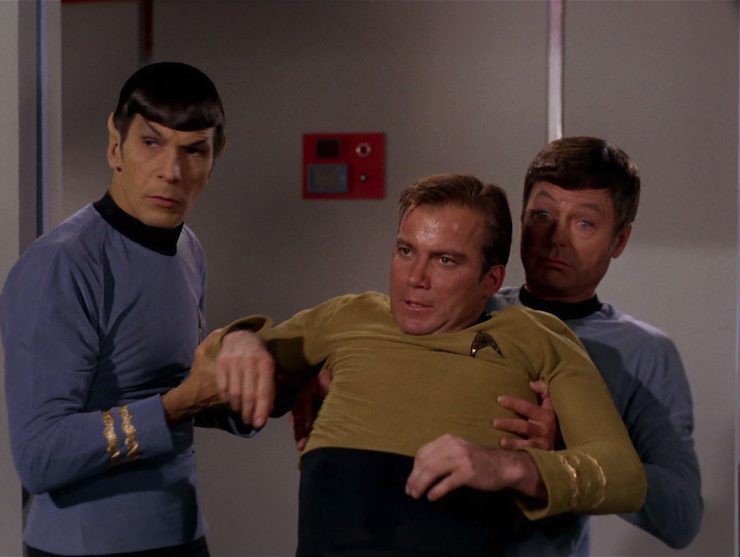
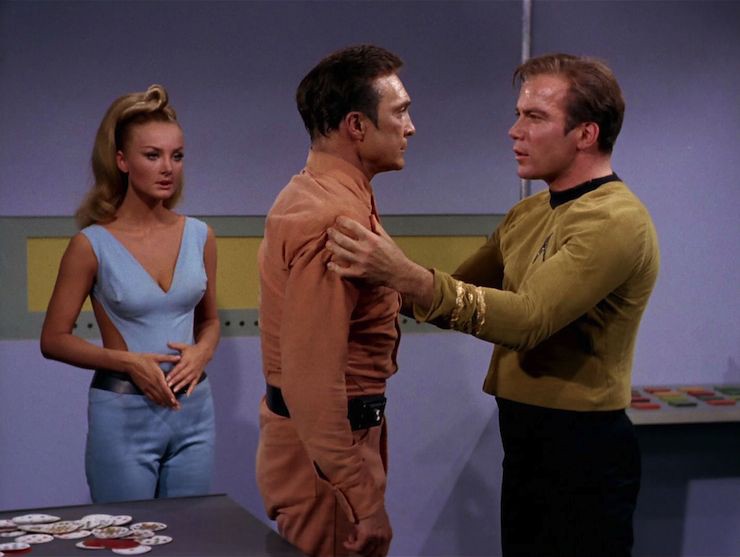
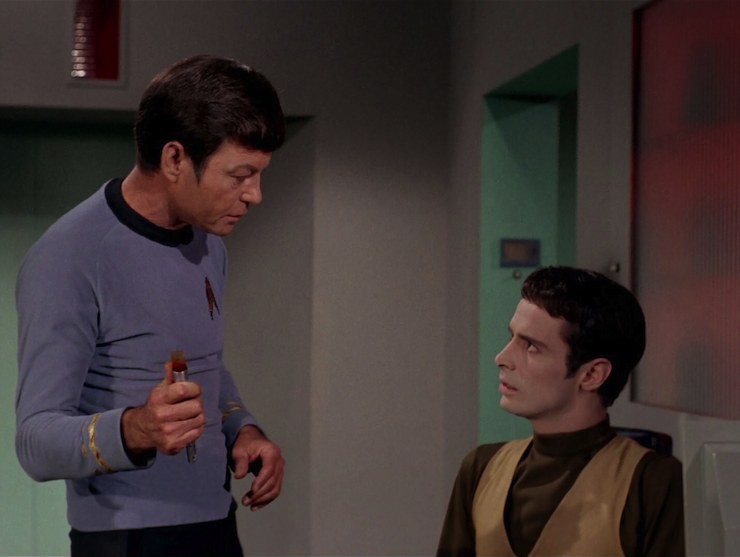
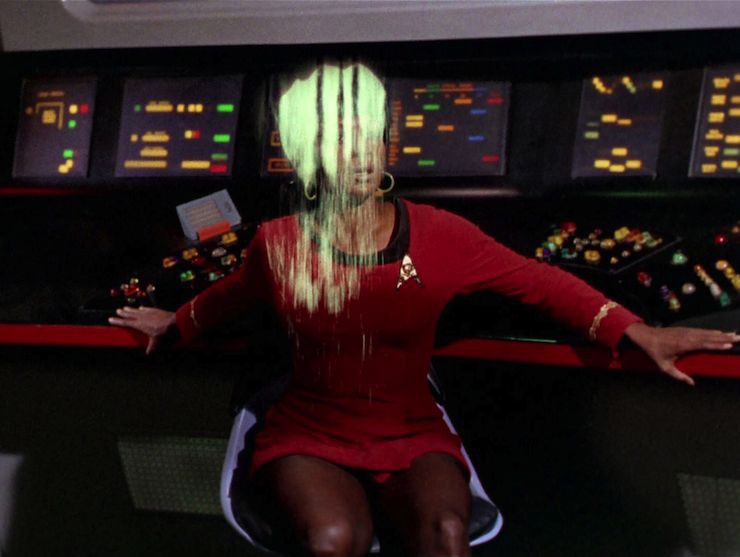
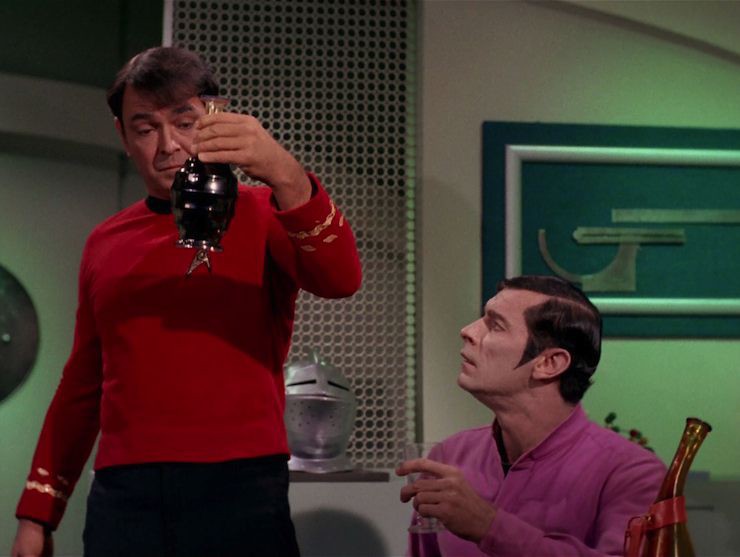
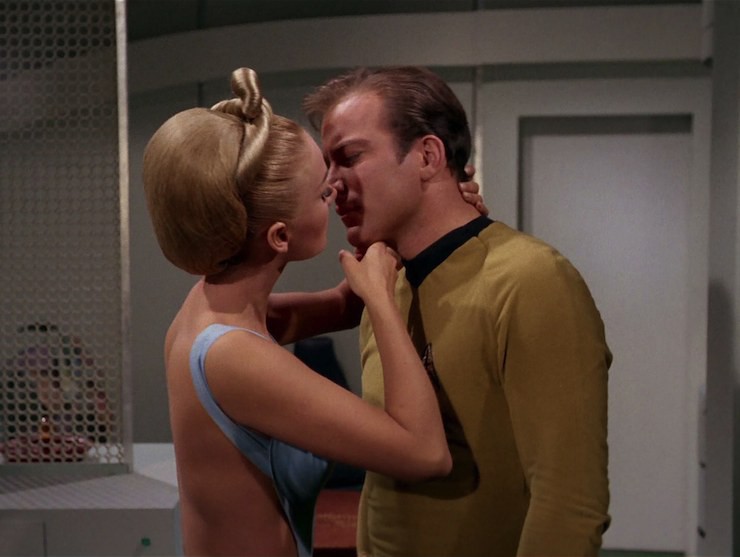
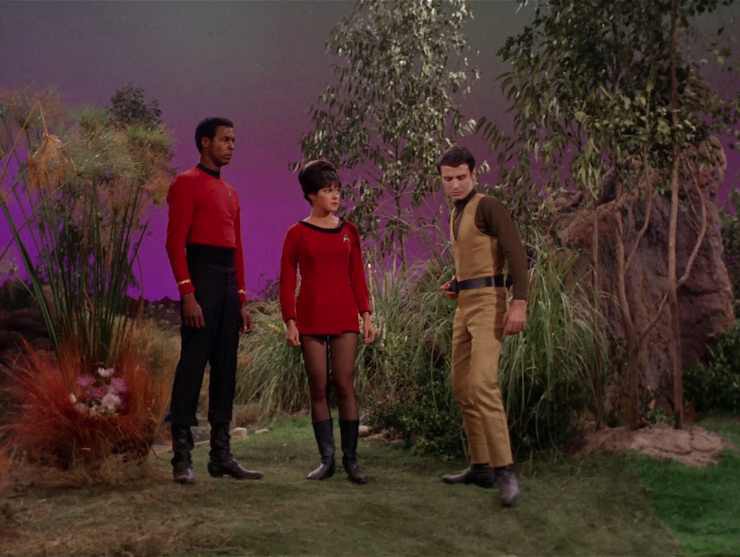
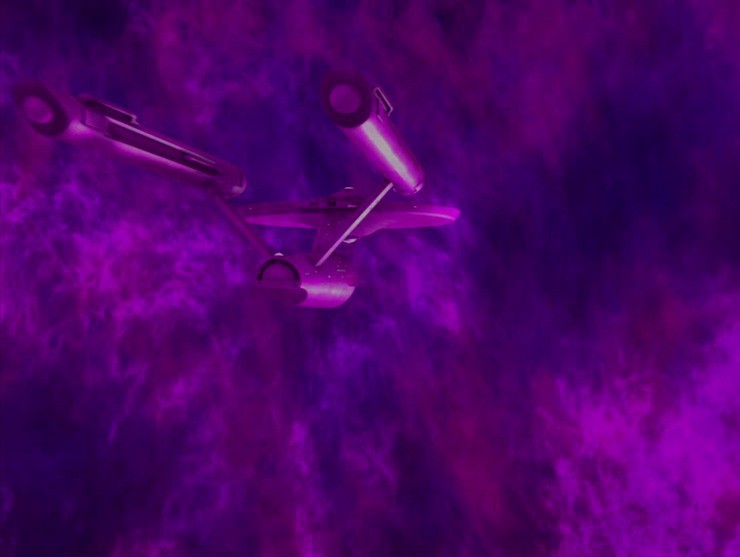
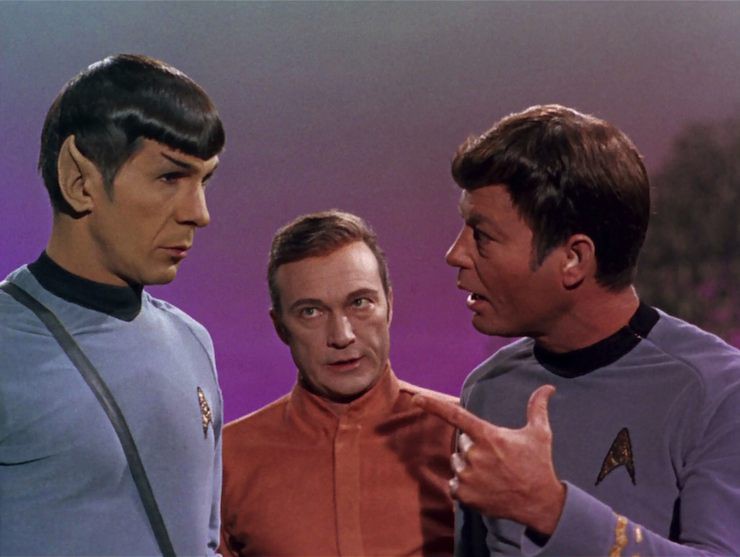
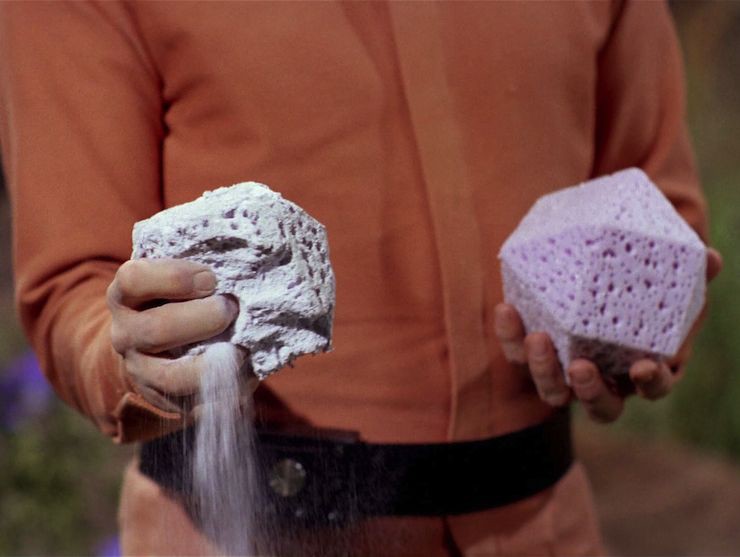
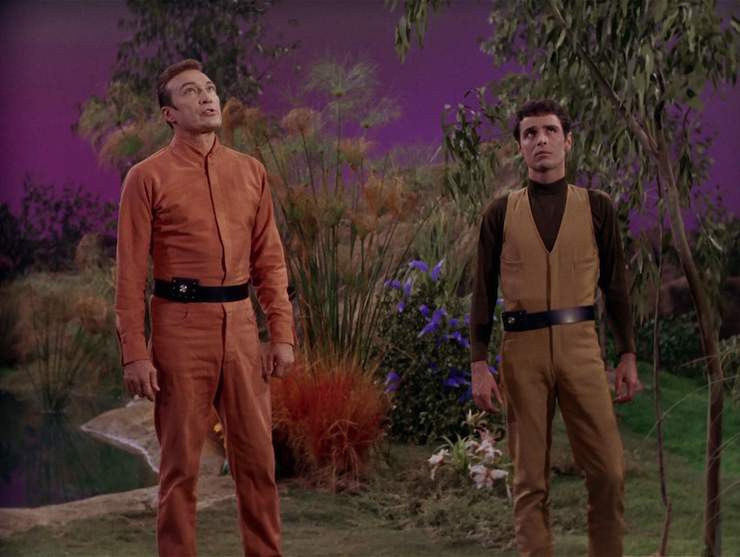
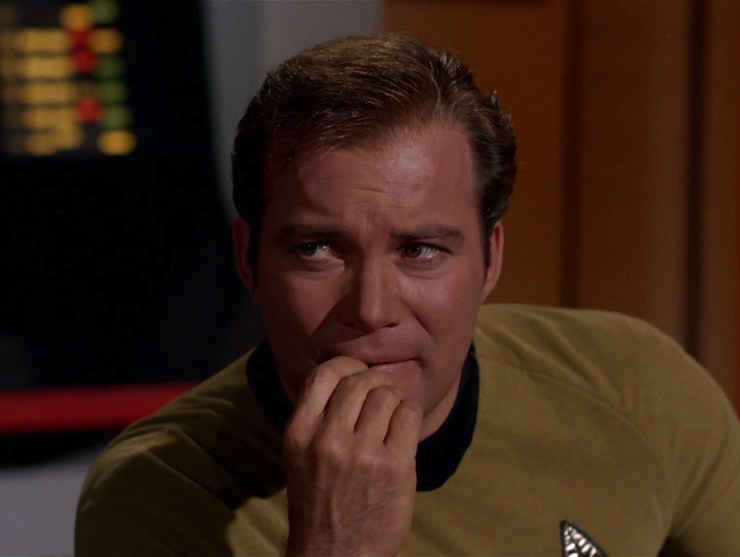
I want to know why they kept Kirk and Spock undodec–thingied. I can get McCoy and even Scotty (although as the engines have been altered…) but surely the most expendable person on the ship to them is the captain? I mean I know that it is because Shatner and Nimoy’s names are in the credits but still. Also, did the entire crew not just killed? I mean surely being reduced to a dry shape means that they are effectively dead by any standard. Whatever gets reconstituted is just a copy really? I really hope they have a different definition of what constitutes having died and continuity of life in the 23rdC than we do. I’m not sure their plan that some descendants would finish the journey is viable either given the small starting population.
Ha! Excellent! A reminder how quirky most of these storylines actually were. And also a reminder that in a 50 minute television slot themes as diverse as galactic distance scales, human corporeal existence and fleeting sensuality could all be discussed. Enjoyably.
Tomar the Kelvan’s name, btw, in Spanish means “to drink.” Booze. Such power to help or hinder.
Much as I would love to take credit, it is actually the mighty Emmet Asher-Perrin who picks the pics for the TOS Rewatch, and she outdid herself — especially with the main pic……….
—Keith R.A. DeCandido
Ah, yes, the sugar cube episode!
The first thought that comes to my mind whenever I see this one is, “will somebody please make sure the whole crew is de-sugared? Between the two crews, there has to be somebody with less than stable footing!”
That said, aside from the fact that our crew again gets captured, I always preferred space episodes like this to faux-Earth episodes like “A Piece of the Action.” I actually want to know more about the Kelvans, and think they could have been an interesting foe, given a better characterization and story.
Unless I’m misremembering this line, and it’s from a different episode, I think the line I nominate for “Channel Open” is “Apologize to me again!”
@krad: They got through the galactic barrier thanks to the modifications the Kelvans made to the ship, same for the lack of ESP activations.
@2 – wburcher: Actually “tomar” means “to take”, in some places we use “tomar” as “to drink”, but most places use “beber”, which is specifically and unequivocally “to drink” .
“We do not colonize—we conquer, we rule.”
In short, that’s the reason I can’t take the Kelvans seriously. They’re hopelessly one-dimensional villains. And that’s why the episode falls apart. Even a collection of truly fun character scenes such as the Scotty booze bit can’t save this show. Plus the episode drags, even though this is a heavily plot-driven piece. This episode really aged poorly.
And let’s not get started with the return to the Galactic Barrier story device, completely ignoring everything that was introduced on that second pilot (Gary Mitchell, frying systems, etc.). This episode also starts the annoying trend of the Enterprise being driven past Warp 11 to the edge of the galaxy thanks to outside forces, a plot device that gets reused so often, it gets old really fast midway through season 3.
Lordmagnusen: except the Kelvans’ own ship was destroyed by the barrier. If their modifications would keep the Big E safe, why didn’t their ship get through? The episode never explains that (for that matter your supposition isn’t supported by the script).
—Keith R.A. DeCandido
@7/krad Maybe they realized where they made some mistake and corrected it? Second time lucky and all that? At least it makes some sort of sense. I get how the crew wasn’t affected – they were sugar-cubed and the four remaining survived the first time without problem (well, except McCoy, but let’s assume he has low ESP rating as well). But ship passing the Barrier is harder to explain, in-verse.
The only good thing about this episode is team scenes and the “let’s overload Kelvans” sequence. But even this we’ve already seen in I, Mudd and it was much more funny. Though Scotty’s antics and the whole interior of his quarters were really great.
But this episode fails so much from the plot standpoint I can’t even. Also Kelvans sometimes look like cartoon one-dimensional villains and sometimes there are hints of them being serious opponents in some dark-dramatic way. I didn’t know there was a rewrite of the plot to make it lighter, maybe that’s the reason.
Rojan’s skin colour changes from pale to brown in the middle of the episode.
Not a great episode, but I like it that we get to see a chess game once again. Also that after all the space monster episodes, there’s once again a story where they save the day by being generous.
@7/KRAD, I’ve always thought that the Kelvan’s ship was destroyed because they didn’t know about the barrier. Perhaps Andromeda didn’t have one and so the first time they weren’t prepared for it but then the second time they were?
Also, in reference to how the ship got through so easily based on “Where No Man Has Gone Before” is easy I believe. In WNMHGB, the ship tried to crawl through at Warp 1, whereas in this episode the Enterprise blew through it at Warp 11, which made crossing time tremendously shorter and therefore there wasn’t time for any of the bad effects to occur this time like it did the first time. They were only in there for seconds this time, whereas in WNMHGB, it was a matter of minutes before they crawled out, most likely.
Let it be noted that Barbara Bouchet (“Kelinda”) is a featured guest as Shore Leave this summer.
http://www.shore-leave.com/guests/
The crumbling of the cube squicked me out before squick was coined. And I was amazed that the cute girl was the one killed.
The ship scenes had some funny moments. I like this one just fine.
Leandar @10- I can accept your speed supposition; the sound barrier is passed more smoothly the faster you break it.
The geometric solid that the Kelvans turn people into is not the dodecahedron (a 12-sided regular solid with pentagonal faces) but cuboctahedron.
@11/Greg – Ooh, I’m totally going to ask her about the hair. And the costume. This is one of my favorite Bill Theiss pieces…
My favourite of the frequent “aliens who take on human form and are overwhelmed by the sensations of being human” in Trek is the Founders turning Odo into a human (which also echoes when Q was turned into a human, though it was Q’s explicit choice as to what mortal form he would take whereas with Odo it’s more inplicit, but of course). Deep Space Nine had the luxury of a character building structure that permitted the transformation’s effects on Odo to be dispalyed with some depth and what might be considered subtlety by television standards. Odo had some moments of crisis and pleasure but he was still Odo. I suppose the villians of this piece had no character to remain in character.
I’ve always wondered — when McCoy was frozen in that pose where he was pointing argumentatively at Spock, what was he about to say? It seemed like an odd time for him to suddenly start arguing with Spock.
The funniest thing about Kirk’s “seduction” of Kelinda is that it totally fails. Sure, she likes the kissy stuff, but she doesn’t have any particular interest in him. She doesn’t succumb to his overpowering Kirkness and become obedient to his will. She pursues further experimentation with sexuality because it gives her pleasure, and she does it on her own time and with her own choice of partners. It’s a marvelous bit of female agency and sexual empowerment in an era when women were still expected to be objects of men’s sexual control.
While the continuity callback to the second pilot is unusual for the era, they did fudge it a bit by claiming the barrier to be made of negative energy. What Spock said in the pilot was, “Deflectors say there’s something there, sensors say there isn’t. Density, negative. Radiation, negative. Energy, negative.” I take that to mean that he was getting no readings of density, radiation, or energy, not that he was reading negative energy. After all, there’s no such thing as “negative radiation” (unless it’s absorption?) and it’s hard to imagine what “negative density” would be.
It’s also worth noting that the word “barrier” was used only once in “Where No Man Has Gone Before.” It was this episode that codified the term, using it 11 times.
And yes, they’re cuboctahedrons, not dodecahedrons. Dodecahedron means “twelve-sided,” and a cuboctahedron has fourteen sides (so it’d be a type of tetradecahedron).
“By Any Other Name” features Fred Steiner’s final original score for season 2 (not counting his “Star-Spangled Banner” arrangements in “The Omega Glory”), though it’s only a partial score, and it recycles themes and motifs from his earlier scores. Kelinda’s theme is a rearrangement of Andrea’s theme from “What Are Little Girls Made Of?” (which in turn was a romantic variant of the general android theme therein), and the “stings” when the Kelvans use their powers are basically the same as the ones from “Charlie X.” And the Kelvans’ theme strikes me as a variant of the leitmotif Steiner used for the Venus drug and the women in “Mudd’s Women” — three rising two-note phrases followed by a fourth descending phrase — though it’s not identical.
Keith, another sequel to this episode was the TNG novel The Valiant by Michael Jan Friedman, the “pilot” for the Stargazer novel series. That featured a group of Kelvan colonists encountered by the newly minted Captain Picard. I wasn’t a fan of the way Mike portrayed the Kelvans there, though, since he treated them as your garden-variety shapeshifter able to alter forms at will, whereas I felt the episode indicated that they’d used technological means to alter their forms — probably some variant of the same technology they used to transform the crew into polystyrene blocks. After all, if they shapeshifted as a matter of routine, they wouldn’t have been so bad at coping with the new sensations the human form provided.
I’ve always been intrigued by the Andromeda Galaxy situation established by this episode and have wanted to follow up on it. Unfortunately, I haven’t yet found a way to make that happen.
But you did edit one — Foundations, Book Three by Dayton Ward and Kevin Dilmore. It shows Scotty and the early Starfleet Corps of Engineers working with the Kelvans on a propulsion upgrade shortly after the end of the 5-year mission.
The two things I remember of this episode, watching it as a child back in the 60s:
• People getting turned into dodecahedrons (I went to art school, I freaked me out
• The drinking scene made me laugh
Taking a look at the show from a *few* decades distance, it strikes me an “eh, that’s good enough” episode. Not great, not good, but also not Spock’s Brain or And The Children Shal Lead.
I usually just lurk. However, I had to note that this was the first episode I ever saw and it got me hooked when I was eight. It was during the original run and I was sleeping over at a friend’s one Friday night. Her mother was a fan and had ST (before it was TOS) on for us to watch as a treat. Like sps49, I was both squicked out (before its time) by the crumbling of the cube but also fascinated. I was invited for a sleepover for each new episode. My parents and brothers were all very confused at to what I found so enthralling about that show.
My friend had several older sisters who were all into the Beatles and had those little dolls (they may have been bobble heads). Each sister had a different Beatle and they all got that Pavel Chekhov was suppose to be the young hip crew member. So maybe those suits were not that crazy. I liked Bones from the get go. Probably because I recognized Kelley form tv westerns my brothers seem to love. And likely my favorite reruns of the time. Perry Mason.
I think if And the Children Shall Lead had been my fist exposure, I would have never bothered with ST again. Spock’s Brain is at least fun camp.
@7 – krad: Chalk it up to differences in the ship constructions, and as Darr says, corrections to their calculations. Leandar makes some good points, too.
@16 – Chris: I guess that if you squint, the Kelinda/Kirk thing it can be seen as female empowerment… but only at a glance, since Kelinda isn’t actually human(oid), and probably not even really female as we understand it. But as a visual metaphor, and to contradict the “Kirk always gets the girl” myth, it works.
@19/lordmagnusen: I disagree — the whole thematic premise of the episode was that the Kelvans had actually become human, that they were “roses by any other name.” So that would mean that Kelinda was actually female now, whatever she was before. (In real-world terms, when someone transitions between sexes/genders, it’s inappropriate to define them by their previous sex/gender. It’s who they are now that matters.) And as a female, she chose to control her pursuit of her own sexual pleasure rather than being subordinate to the whims and manipulations of a male. Let’s face it, Kirk chose that particular way to awaken her emotions because she was female. He never would’ve tried to seduce Rojan or Tomar. So we can’t pretend the interaction was non-gendered.
I see your point. Still, the Kelvans were not completely bound (even if they were overcome by their human desires and senses) by human morality or gender-concerns, so it’s not like she was actually defined by her gender when she was primarily dealing with being human. I do see how, outside the story and when seeing the actors on screen perform the actions, we can see this as female empowerment.
@21/lordm: I’m thinking more about how she didn’t let herself be bound by Kirk’s gendered expectations. And, more to the point, how Dorothy Fontana (and Jerome Bixby?) didn’t write her behaving the way one might’ve expected a male writer of the day to portray her, as just a prop to cater to the man’s desires.
I’d say the beauty of it is that the seduction fails and succeeds at the same time – it fails as a seduction, but it succeeds by making Rojan jealous and agitated (nice teamwork by Spock and Kirk). And since that’s what happens, that’s the opportunity they take advantage of.
The fact that Kelinda learns about kissing from Kirk but is ultimately more interested in Rojan reminds me of Andrea and Korby in What Are Little Girls Made Of?, with the difference that Kelinda is cool and in control, and doesn’t get killed.
Generally, the female Kelvans make a better impression than the male ones. Not only Kelinda, but also Drea, who doesn’t have a big role but appears competent and self-assured throughout. Whereas Hanar is extremely gullible – it never occurs to him that McCoy might use that hypo to kill or stun him.
@23/Jana: I don’t see the similarity to Andrea. She was just a sexbot blindly following her programming to please others, offering herself indiscriminately to any man she saw. Kelinda was horny and looking to please herself with the man of her choice.
@24/Christopher: Oh, I didn’t mean that they were similar characters. I totally agree with you about Kelinda. I meant that a similar plot element has been used before, under different circumstances. Just like “sensations are new to them and will confuse them” has been used before in Catspaw, and calling kissing something else (helping, or apologising) has been used before in The Gamesters of Triskelion. Which pretty much sums up all the serious Kirk-kisses-the-enemy episodes. I think this episode deliberately plays with all that.
@25/Jana: Oh, I see your point. Yeah, the fun part is how it subverts the expectations of the “Kirk seduces the spacebabe” trope that’s become established by this point.
I don’t know, I don’t really mind this one. I am biased to episodes that take place either entirely or mostly on the ship, and this one is no different. I always forget about the similar themes used in episodes, like the intergalactic alien taking human form and being overwhelmed by human sensations trope, so it also gets a pass for that. Rojan’s very obvious jealousy is particularly hilarious, as is the fight between him and Kirk in the rec room (I love how Kelinda just looks on curiously, making no attempt to stop it). Speaking of Kelinda, her not being seduced by Kirk’s manly manliness is a nice change of pace, as she chooses to deal with Kirk on her own terms, not his. And of course James Doohan is hilarious as drunk Scotty.
Scotty (to the whiskey bottle): Oh, I was saving you for–
Tomar: What?
Scotty: Nevermind. Give us your glass.
The crew being reduced to blocks always squicked me out (if I can borrow that). I mean, are they conscious in that form? Could they survive three centuries as blocks?
An okay episode, but I agree it probably would have been better had it been a little more serious.
I rewatched this recently. Shouldn’t we have had a scene where it was established the Vulcan nerve pinch didn’t work on the Kelvans? Otherwise it would’ve been a nifty means of disabling them.
I haven’t watched TOS since I was a kid, and as I rewatch them now there have been 3 or 4 episodes that take me right back into my parents’ living room, me sprawled out in front of the old console TV with the fine dark woodgrain finish. :) This is one of them – I remember being horrified at the thought of being freeze-dried into one of those pumice-looking thingies; I remember thinking Kelinda was really hot; I remember thinking Kirk was a pansy for being so horrified at the thought of sacrificing the ship and crew to stop the Kelvans; but mostly I remember being thoroughly entertained at Scotty getting tanked with Tomar. I was fascinated by the old dusty bottle that he kept hidden in the knight helmet. So much so that I raided my dad’s liquor cabinet to get my first taste of scotch.
As far as I’m concerned the hilarity that ensues when Kirk and co. decide to introduce the Kelvans to the joys of human sensation makes it all worthwhile.
Aside from the sugar-cube business—which I did not like at all—this was a pretty good comedy, errors and all. The two funniest scenes were 1) Scotty drinking the other guy under the table and then passing out himself, and 2) Kelinda getting thoroughly hooked on the “apology” bit, first with Captain Kirk and then with Rojan himself. The serious aspect of the whole thing was the fact that these aliens, having taken human form, were now experiencing human emotions and feelings and were having a lot of trouble getting used to them.
I hope that memory serves me correctly here – I have Seasons 1 and 2 on Bluray, but so far have been content to just check out the DVD’s from the local library when I want to see something from Season 3 – but I believe that in that scene where Spock attempts to make telepathic contact while they are being held in a cave on the planet surface, Spock learns that the Kelvin’ original bodies had either many arms or possibly even tentacles.
Which makes it amusing that Kirk kisses Kelinda. Like that line from Galaxy Quest ..”Ooh … That’s …Just … Wrong!”
Kelinda, by the way, makes a great name.
@32/Keleborn Telperion: This is a season 2 episode, so you should have it on blue ray. Anyway, do you know that there’s a website with Star Trek transcripts from all the TV shows and films? It’s called chakoteya.net. I get all my quotes there. I do know some of them by heart, but only in the German dubbed version.
The quote you’re looking for is this: “Immense beings, a hundred limbs which resemble tentacles.”
But… I don’t find it amusing that Kirk kisses Kelinda. First of all, he isn’t really attracted to her, he has an ulterior motive. He also kissed Sylvia, who was really a small blue worm. Then, Kelinda is no longer an immense being with a hundred tentacles when he kisses her. We have all looked rather weird in the past… say, half a year before we were born. But most importantly, I find interspecies love affairs actually rather sweet, and Star Trek never presents them as “wrong”, either. In “Metamorphosis”, Kirk, Spock and McCoy are baffled when Cochrane is appalled that his cloud creature loves him. And have you seen the TAS episode “The Survivor”? There a crewmember falls in love with a shapeshifting, multi-tentacled alien, and the main characters simply accept it. It’s one of my favourite TAS episodes.
@33/Janajansen,
Ohhhhhh myyyyyyy, as George Takei would say (how did all that start?), yes I do have it on bluray! Somehow it feels like a Season 3 episode, though.
Well, its a bit difficult for me to analyze this episode with a serious attitude; I enjoy it, to the extent that I do enjoy it, as a comic episode. But if I were to take it seriously, then I could hardly object to Kirk attempting to seduce Kelinda, for the purpose of trying to regain control of the ship. It’s not the kind of thing I would like to see on Star Trek, but I would not object if Kirk and company had found an opportunity to cut the throats of the Kelvins and taken it. These people had already casually murdered two of the crew and effectively ended the lives of about another 400. It’s a premise of Star Trek that there has to be a better way, and I appreciate that they always look for one and nearly always find it. But sometimes it isn’t there, and if you don’t strike with the weapons available, you are condemning to death the ones you might have saved.
As for TAS, I once purchased them on DVD, and then gave them away after viewing them. They were OK for what they were, but I did not anticipate wanting to view them a second time.
As for interspecies relationships … Isn’t that what male/female relations are?
Kidding aside, Data is effectively another species, and I would happily be friends with him. Rayna is so beautiful that it hurts, and has a lovely personality too, but I’m inclined to feel that it would be best not to.
Of course, I can imagine a loving “meeting of the minds” with a member of another species, like that between Miranda and Kollos. Let’s hope that it is possible, because it would go a long way toward keeping us from killing each other, should we ever make contact with another intelligent species. (I assume the Dolphins are taking a wait-and-see attitude toward us before revealing themselves.)
@34/Keleborn Telperion: It’s definitely a lighthearted story, and if you think about it, the solution probably wouldn’t work. Can you imagine the message Rojan will send to Kelva? “Found a nice little planet. Decided that we should abandon our plan and become tiny creatures with almost no limbs. The food is great!”
But I will always like an episode where the hero convinces the enemy to become friends in the middle of a fistfight.
@35/Janajansen,
Had a brief look at the episode again. I agree, that was a special moment:
Rojan: You would really do that? You would extend welcome to invaders?
Kirk: No. But we would welcome friends.
Spock: Rojan, you were only a link in a chain, following an order given 300 years ago This is an opportunity for you to establish a destiny of your own.
Rojan: Perhaps. Perhaps it could be done.
I actually thought there was a kind of emotional logic here in having the fistfight. Previously Rojan’s attitude was one of cool superiority: in that state he was not likely to respond to either logic or emotional appeals. By getting Rojan angry and engaged on equal terms in a fistfight, Kirk was in effect establishing rapport. Similarly, by talking throughout the fistfight, Kirk was framing the fight not as a pure struggle for dominance, but as an attempt to engage, to communicate. Although, in the final moments of the fight, Kirk was winning, so maybe accepting the peace offering could be interpreted as a way of saving face – better than being choked into unconsciousness in front of Kelinda. Then, most sensibly, Kelinda seals the deal by saying that she “owes Rojan an apology”.
And that’s how you tame the male ego. What can I say? We’re descended from apes after all.
@36/Keleborn Telperion: Good analysis. Yes, this episode really needs the fistfight. Some of the others, not so much.
Two cheers for this uneven mash-up of Lovecraftian cosmic horror and slapstick comedy… but I was always most intrigued by Lezlie Dalton’s character, Drea. (Irrationally so, I suppose, though Dalton’s serene presence shines through; it’s not hard to see in her the featured player on Dean Martin’s comedy hour that she’d soon become.)
We don’t spend as much time with Drea as we do her comrades, with the possible exception of Hanar (I’d need to get out a stopwatch for that one), but while the rest of the Kelvans quickly degenerate into jealous, randy, drugged-up drunks, Drea flies the Enterprise. She sits on the bridge, alone, and does what she’s supposed to do to achieve the Kelvans’ mission. In fact, Rojan tells Kirk that Drea doesn’t need anyone else around to help her do her job, which is why all her pals have enough free time for Kirk’s plan to work.
But Drea? Drea flies the ship. She polyhedron-izes Chekhov per her boss’s wishes, sits down and… flies the ship. She does her job, apparently the only job that needs doing, and when Rojan rings her up at episode’s end to turn command back over to Kirk, she seems as incredulous as you might imagine she’d be. It seems she’s been up there the whole time, by herself, assuming her dissolute companions are doing whatever they should be, and just… flying the ship. And in the meantime, everyone else has up and failed the mission.
I’ve never been one for wondering too much about what the fictional lives of minor characters from Star Trek are like when they’re not on the screen. But I’d pay good money to see an animated feature, with Dalton brought back for voice work, that gave us “By Any Other Name” from Drea’s point of view. Who knows what was going on with the newly intergalactic Enterprise while everyone else was getting wasted and handsy down on the lower decks? Only Drea, and I suppose she’s not telling.
@38/Texactly: That would make a great fan film!
Re-reading the comments:
@1/Random22: The small starting population wouldn’t have been a problem as long as none of them carries a genetic disease. Which they probably don’t, given that their human bodies have been artificially made. It just means less genetic diversity.
Besides, they could have restored selected crewmembers for breeding purposes at any time.
The bigger challenge would have been to keep the Enterprise running for hundreds of years without access to a maintenance facility.
@39/Jana: Given the Kelvans’ advanced matter-transmutation capability, they probably could’ve easily reconstituted any damaged or worn-out part as an intact part. They might have occasionally needed to replenish certain raw materials, but intergalactic space isn’t entirely empty, and there probably would’ve been the occasional rogue star or planetoid they could’ve mined. After all, they did succeed in making the journey once, to get to our galaxy in the first place.
@40/Christopher: Good point.
Now I want to read a story that describes the outward journey from little Rojan oder little Kelinda’s point of view. Lovecraftian preschoolers on a generation ship! How’s that for a mash-up?
After Kirk slaps Rojan, apparently the Kelvan expression of rage is so intense it actually changes the color of the uniforms from a soft peach to babycrap yellow.
They should have made a remake where the Kelvans talk about their ancestors, who turn out to be all of the Star Wars main characters. it would make sense since Star Wars takes place in the past and in the Andromeda galaxy, and it would be cool to have a crossover between the two biggest sci fi titles
@43/Chancerbox: Provided the Star Wars characters are really immense beings with a hundred tentacles. Imagine how many lightsabers they could wield!
After reading about the camerawork on Shatner’s caboose in your review of “The Corbomite Maneuver,” I expected to find a mention of the memorable scenes featuring the Kelvan women’s backsides. Here I will mention them.
I know that this is off topic. When I was in high school (1977-81), I read an essay (either in Trek or Starlog or Omni or ?) that proposed that the only way to account for all the continuity problems between some TOS episodes was that some episodes took place in different universes. Has anyone else read that essay?
Minor discontinuities are routine in episodic television. I usually ignore them. Big stuff like changes in personality, rewrites of backstory and shifts in look bother me more but if I like the rest of the product I ignore.
@46/Paladin: Roddenberry’s own explanation, basically, was that Star Trek was just an imperfect dramatization of the “actual” future events it depicted. In his preface to the Star Trek: The Motion Picture novelization, he presented himself as a 23rd-century producer who’d made an “inaccurately larger-than-life” show dramatizing the Enterprise‘s missions, accounting for the changes between TOS and TMP by saying that the latter was a more accurate interpretation because Admiral Kirk now had approval over the content. He similarly told fans at conventions to accept that the Klingons had always had ridged foreheads and TOS just hadn’t had the budget to show it correctly. (It’s worth noting that Roddenberry got his start in TV by writing up police cases for Dragnet, a show that dramatized real crime stories. I find it interesting that both Dragnet episodes and Star Trek episodes are framed by narration presented as the lead character’s official report of the events being dramatized.)
So the simplest explanation for continuity errors or inconsistencies between shows is that they’re just inaccuracies in the telling, or the result of conscious artistic license. What we’re seeing is a constructed approximation of a hypothetical universe, and any human construct has imperfections, whereas no two artists depicting the same subject will depict it in exactly the same way. So resorting to whole alternate universes is overkill. It’s simplest just to assume we’re seeing the same single universe portrayed in varying ways by different interpreters.
@48/CLB & @47/P: Yes, I agree with you. Nevertheless, I would like to know if anyone out there in Torland has read the essay I mentioned, supra? Or, I am merely confabulating?
@49/Paladin: It’s an idea I’ve heard crop up on multiple occasions. No single example stands out as exceptionally worthy of comment.
Wait, you mean they aren’t historical documents??????
—Keith R.A. DeCandido, probably not a Thermian
@51/krad: Even historical documents aren’t always reliable.
An interesting bit of trivia is that Julie Cobb (daughter of Lee J. Cobb) was married to Trek mutiple-alumnus James Cromwell from 1986 to 2005. She is also the mother of Rosemary Morgan, who appeared in an episode of ST: Voyager.
Taken for what it largely is from the D.C. Fontana rewrite, I enjoy this episode a lot as fluff. I always look forward to it during rewatches. Scotty’s antics getting Tomar drunk is comedy gold to me.
A few other things…
@krad: It’s actually McCoy that says about the food: “Before you condemn it, why not try it?”
I nominate Kelinda’s line: “I was wondering, would you please apologise to me again?” for a ‘Wah-HEY!’
I love the dialogue at the end where Kirk says that they won’t welcome invaders, but friends. It’s very Star Trek
@34/Keleborn Telperion
Wasn’t it only one person they murdered, Yeoman Thompson?
My theory on the barrier (although I do like the warp 11 poking the ship through faster theory by #10/leander) is that perhaps not all segments of the barrier are as intense as the one that turned Gary Mitchell and Elizabeth Dehner into true super espers. Assuming they tried leaving where the Kelvans entered, it’s highly improbable and then some, that this section was the same as in “Where No Man Has Gone Before.”
@54/Thierafhal: In my novel The Higher Frontier last year, I posited that the Kelvans’ modifications to the Enterprise included shielding against the psionic effects.
Also, Mitchell and Dehner were already espers, which is why they were susceptible to the barrier; it supercharged their existing abilities rather than creating them. Remember, Spock called up their past records showing their high ESP levels.
@55/CLB:
Well I didn’t forget that, but I was thinking of what Mitchell said in the cell: “Man cannot survive if a race of true espers is born. In time you’ll understand that.” Mitchell and Dehner’s records stated that they had high levels of potential. Weather either of them ever utilized that before the accident in even the smallest degree is never made clear. So ya, I should have been more accurate, but the “true espers” line stuck with me and that was what I was basing my comment on even if it wasn’t technically accurate (I’ve since changed it).
I just rewatched this as it was one of my favorite episodes as a kid. Always freaked me out when Rojan crushed the cuboctahedron form of the red shirt… Yes, I had to look up that word, lol
Anyway, I found it interesting that traveling across the “quadrant” , meeting an alien race, that Rojan and Kirk have practically the same haircut , down to the pointy sideburns =)
@57/jmsync2:
I’ve always liked this episode too. I’ve seen it countless times and I’ve never ever noticed Kirk and Rojan had the same haircut, haha!
Lieutenant Shea was my favorite aspect of the episode. I wish he got more to do. The fact he wasn’t crushed had me thinking he would do something cool later, but nope, that was the end of his relevance. What a waste. Hopefully, he gets some cool adventures in tie-in fiction.
@57/jmsnyc: In his birth form, Rojan looks nothing like Kirk. He’s an immense being with a hundred tentacles. When he assumed human form, he probably assumed a common haircut, too. Why waste imagination on trifles?
@59: When I was little and watching Star Trek for the first time, Lieutenant Shea absolutely fascinated me, partially because he was a redshirt who didn’t die and actually seemed to have some personality, but also because (at least to my 9-year-old mind) he was so tall when compared to all the other officers–he just towered over them! Of course, I later found out that this was actually because William Shatner was fairly short, but I didn’t know that originally. I always thought if I ever was lucky enough to write a Star Trek novel, I’d bring back both Shea and Garrovick (from “Obsession”) as security guards, just because I’d always found them interesting.
@61/Clay: Shatner isn’t short, just average. His IMDb bio gives his height as 5′ 9 1/2″, which is just about exactly average height for an American adult male (though he’s Canadian). It’s also about half an inch below my height.
Although I wouldn’t be surprised if tall men were proportionally more likely to get acting jobs, so that someone of average height for the general public might be comparatively short as actors go.
Remember that this is the site that let a statement like ridiculously tall folks like Dorn, Todd, Massett, and Cooper go unchallenged in the re-watch of TNG: The Sins of the Father, when Tony Todd is a sensible 6’5″, and Michael Dorn only 6’3″.
I think I saw this once many many years ago, and not sure if I even saw the episode the whole way through. But the scene of the two redshirts on the planet being turned into the geometric shapes and then one of them is crushed and turns out to be the poor yeoman always stuck with me as very sinister and disturbing.
Now, having just seen this episode in full, that scene is no less powerful to me, but the episode as a whole seems schizophrenic to me. It starts out with this antagonist that seems truly formidable against our heroes and then midway through there is a tonal shift to silly comedy. If I were to ascribe a TNG equivalent, it’s like the first half of this episode was like “Where Silence Has Lease” with a powerful foe that threatens the entire crew, and the second half is like “Rascals” where the ship takeover is silly antics and comedy. The comedy bits here are actually quite good but I felt inappropriate and jarring considering the menace and threat of the Kelvans that was initially set up and demonstrated. The Scotty bit getting the Kelvan drunk and also himself was excellent and well-played by Doohan. And I also enjoyed (the expected) Kirk (tries to) seduce the hot alien chick and though they do smooch a lot, she retains her agency. But the ending felt abrupt and I was bothered by the lack of remorse or reflection on poor Yeoman Thompson. But hey, the Black male redshirt survived so that was kind of a surprise!
Also, Barbara Bouchet was gorgeous and that was a very nice costume design by Bill Theiss.
And, as has been mentioned, the aliens taking human form and being overwhelmed by the sensations, feels like it happens far too often on this series with similar circumstances happening in “Catspaw” and “Return to Tomorrow”. I guess it’s one way of saving on the budget by not having to do expensive alien makeup and prosthetics!
Oh yeah, and I was shocked, shocked I tells ya, when Kirk calls Scotty and Spock mad for proposing to blow up the ship to prevent the Kelvans from their nefarious plan. It was so out of character for Kirk and not how the captain should has responded at all. His officers were thinking clearly and competently and Kirk came across like a cowardly captain. Sure, Kirk could disagree with the plan if he believes he can still get control of the ship or persuade the Kelvans to give up, but to call his officers “mad” and be shocked by the very sensible proposal was so out of character and like the writers forgot who they were writing dialogue and characterization for.
@19, @20: Presumably, even in her tentacle monster true form, Kelinda was actually female. After all, as we learned in “Metamorphosis,” the male/ female dichotomy is a universal constant.
While I actually quite like this episode, two things have always bothered me about it. The first was mentioned in the review – that Kirk waffled when he should have gone along with the plot to blow up the ship. That felt out of character, and since the Kelvans were supposed to have known about the attempt, they should have been the ones to stop it.
The other thing that always bothered me was that when Spock puts himself into a trance, he doesn’t sit down first.
@64/@66: Especially since Kirk had no objection to self-destruction (as I recall) in “Let that Be Your Last Battlefield”
@67/AndyLove: I think the difference is that Kirk was using the self-destruct as leverage to get Bele to back down; he was willing to go through with it if he had to, but there was room for it to go either way. In this case, it wouldn’t have been a threat or leverage; it would’ve just been destroying the ship, period. As Kirk said, he didn’t do it because he didn’t believe it was the only way to stop them. So it’s not inconsistent. In both cases, he chooses to give himself options, to allow the possibility of another way out. And in both cases, he turned out to be right.